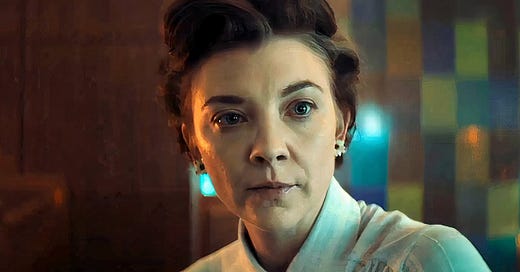Audrey's Children
A smart, straightforward "great woman" biopic looks at the unheralded impact of Audrey Evans, a British doctor whose work in the States on pediatric cancer changed the course of history.
Dr. Audrey Evans was one of the those figures history seems to have misplaced, or possibly intentionally shirked.
Natalie Dormer (“Game of Thrones”) plays her in “Audrey’s Children,” a full-throated embodiment of a woman who was quirky and stubborn, challenging the male-dominated oncology field at a time when they were not very welcoming to non-white dudes. She’s not a household name, but probably should be owing to her pioneering work in pediatric cancer.
When Audrey began practicing oncology, only 10 percent of kids with cancer survived. Within a decade of her groundbreaking work on staging treatment, it had hit 80 percent and continued to rise. She did not invent a new cancer drug or protocol, but looked at how the existing ones were working (mostly not) and thought up new combinations and advocated for tailoring treatment plans to each patient.
Director Ami Canaan Mann — British-born and Indiana-raised — and screenwriter Julia Fisher Farbman give us a smart, straightforward “great woman” biopic in the mold of “A Beautiful Mind” or “The Theory of Everything.” Those scientists were heralded as geniuses during their lifetime, thought it’s taken a bit longer for Audrey, who died just a couple of years ago at age 97, practicing medicine well into her 80s.
She became known as “The Mother of Neuroblastoma,” which is a telling moniker for a woman who dedicated herself to saving innumerable children but never had any of her own.
The movie starts in 1969 and covers the next few years during her time as head of pediatric oncology at the Children’s Hospital of Philadelphia, known colloquially as CHOP. She’s brought in by the forward-thinking chief medical officer, Koop, played by the great Clancy Brown with owlish glasses and puffy goat’s beard. I did not put it together until the end that this was C. Everett Koop, who would later go on to become Surgeon General during the 1980s.
Koop is clearly impressed with Audrey and wants to be her champion, but she keeps disappointing him with her aggressive, rule-bending approach to cancer research. At one point desperate for funds, she personally lobbies a large pharmaceutical company for the money. She’s pleased by the $1 million grant she receives — far more than she’d asked for — but is shunned by her colleagues whose studies go unfunded as a result.
“Find the line, Audrey,” he growls, in a way that somehow manages to be both warm and warning.
She finds something of an ally in Dr. Dan D’Angio (Jimmi Simpson), an independent-minded, somewhat peevish fellow. Introverted and smart, he’s at first put off by her pushy manner — balanced by a fine British lilt — such as finding her in his office upon their first meeting, opening his mail.
Dan believes in Audrey, but also wishes she were more patient and worked within the existing system. Of course, like all great minds pushing the envelope of science, that’s not for her. Dan has to decide if he’s going to embrace this chaos, putting his own career at risk.
After a couple of unwieldy collaborations, they eventually form a warm, supportive relationship with hints of a possible romance, though we never see it come to fruition onscreen.
In addition to her research, Dr. Evans was also a pioneer in another way: supporting a total treatment plan that addressed not only the kids’ physical health but their mental wellbeing and emotional needs.
Further, she found ways to help the families of the children with cancer, who often traveled from all over the country to get treatment and understandably wanted to stay close by. Despite being one of the most lauded medical centers in the country, CHOP had parents sleeping in chairs or even on floors during the night.
Audrey eventually finds a way to help them, too, though I’ll leave that for you to discover.
It’s a very tight, tidy performance by Dormer, who shows us both the grace and the grief Dr. Evans seemed to bring to every relationship. She could be bossy and demanding, but also very empathetic and even charming when she wants to be — usually because she needs another doctor to share their research data, or a donor to pony up some extra funds.
The truth is that driven people can often be a pain to deal with. They’re so focused on what they want to achieve, even for benevolent purposes, they wind up behaving like jerks to their colleagues. This is best encapsulated by another doctor, Jeremy Lewis (Ben Chase), who’s Koop’s right-hand guy, who can’t stand Audrey at first but eventually sees the value in her work, if not appreciating her approach to it.
Dr. Audrey Evans was a true medical game-changer, and it’s not exaggerating to say there are millions of kids who lived as a result of her innovations. “Audrey’s Children” is a well-made salute to an amazing legacy.





